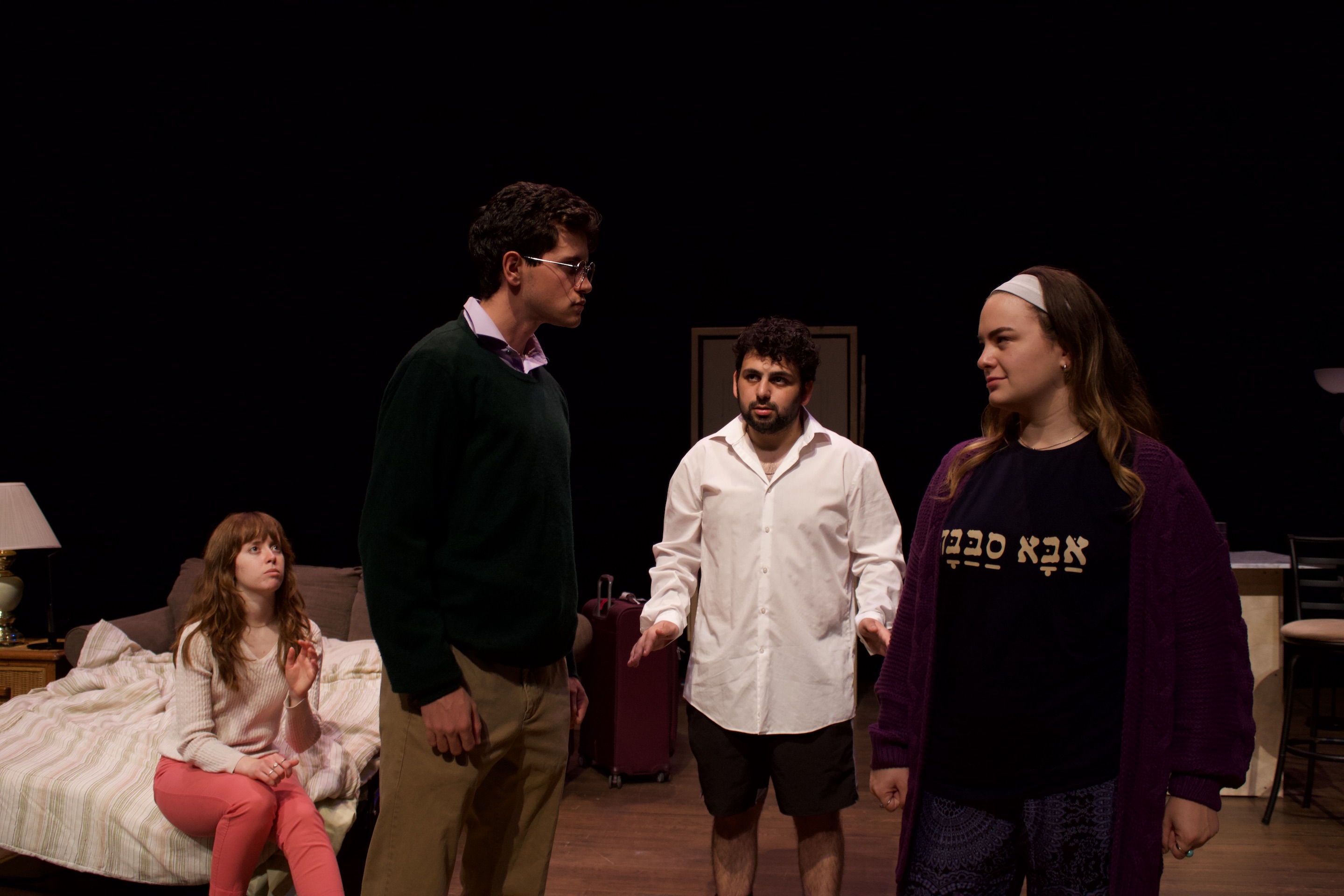
c/o Ruby Clarke ’24
The dark comedy “Bad Jews” by Joshua Harmon went up in the Patricelli ’92 Theater on Friday, Oct. 26 at 7 p.m. and Saturday, Oct. 27 at 2 p.m. and 7 p.m. Directed by Miles Allen ’24, “Bad Jews” depicts two brothers—Jonah (Kyle Reims ’25) and Liam (Cyrus Berger ’24)—and their cousin Daphna (Hadassa Garfein ’24) in the wake of their grandfather’s death and funeral.
The central conflict revolves around the inheritance of their grandfather’s chai—the Hebrew word for “life”—necklace, traditionally worn by men. Daphna, who is the most religious of the three, wants the necklace as a reminder of their grandfather and the importance of their Jewish faith. However, she’s unaware that it has already been given to Liam, who wants to use the necklace to propose to his non-Jewish girlfriend Melody (Alix Livermore ’24) as his grandfather did with his grandmother. Jonah simply wishes to be left out of the conversation.
“I was particularly drawn to how [Harmon] constructed his play around positioning a ‘Good Jew’ vs. a ‘Bad Jew’ in a way that didn’t feel forced, but instead honest about the American Jewish experience,” Allen wrote in an email to The Argus. “Since it felt so real to me, I wagered it would ring similarly true for the sizable Jewish population on campus. In bringing this play to Wesleyan, I wanted to offer both the creative team and our audience the chance to tackle the complezx questions the play asks: how do we move forward with our Judaism in the 21st century, if at all?”
One of the questions raised during the show was the impact of intermarriage on Jewish identity. For Berger, who has a Jewish father and a Catholic mother, playing Liam, who struggles to connect with Judaism and plans on marrying outside of the faith, was a personal reflective experience.
“I spent a long time trying to wrap my head around that character and understand why he is the way he is,” Berger said. “I was thinking a lot about his relationship with his grandfather and how that causes him to take the course of action he’s wanting to take with the chai, something that I personally would really disagree with. But it was interesting to try to think about his mindset and what led him to that place…. One great thing about the play is that there’s so much ambiguity on how you can feel about the characters.”
During the climax of the play, Daphna accuses Liam of killing something if he gives the chai to Melody, stating that their marriage and the subsequent birth of their children and grandchildren would bring them further and further away from what the chai, and its ties with their family’s history, represents. Garfein discussed the process of grappling with a character whose stance on Judaism she personally disagreed with, while also considering her own identity through where she and the character converged and diverged.
“That balance of trying to construct your identity through these differing opinions is a project that we’re all invested in, and something that we do in our day to day lives,” Garfein said. “To see that actualized onstage is always a really cathartic experience.”
Garfein, like Daphna, is the granddaughter of a Holocaust survivor, and saw in the play many of the same generational impacts the genocide had on her family.
“I didn’t always see myself represented in [Daphna] and I think it’s hard to grapple with somebody that has been through similar life experiences as you have, [taking] those on in such a different way,” Garfein said. “In my adulthood, I’ve had to come to terms with [the fact that] so much of my family was calculatingly murdered or survived something so unspeakably horrible, yet I have been granted all the privileges in the world of being a white, Jewish, affluent woman in New York City, and trying to understand how I deal with that through my life versus how Daphna deals with that.”
Allen cited the support of stage manager Rebecca Drucker ’24, acting coach Madeleine Levinsohn ’24, and dramaturg Serena Levingston ’24 in bringing the show to life. The chai necklace used during the performance was lent to the production by Drucker, who inherited it from her grandmother, who in turn received it from a Jewish women’s organization.
“[The necklace] was actually a feminist take back of the chai, which is a theme that is discussed in the show: men’s things going to men,” Drucker said. “It definitely is something that I feel really connected to through the women of my family, because my grandma and my mom have always wanted to raise strong young women. Having my chai is a reminder that they want that for me.”
Drucker also spoke to the challenge of navigating the theme of Jewish identity while also considering how the experiences of the cast and crew intersected and offered different perspectives on the show’s production.
“When thinking about how to interpret parts of the show and how to view the different aspects of it, I think it’s very easy to fall into a personal analysis of yourself,” Drucker said. “It’s gratifying, but it was also probably one of the more challenging aspects.”
Allen elaborated on how important this play was to him and the cast. He explained how it was surreal to see the show develop from something in his head to something that took on a physical form, from the actors moving around the stage to the costumes that Allen selected.
“[T]he play felt like such an extension of myself, and, yet it lived and breathed in ways that felt like I had nothing to do with,” Allen said. “I was blessed both with meaty roles written by Joshua Harmon and extremely fresh and intelligent actors…. Watching them explore and mine new nuances on stage was the greatest reward.”
Rose Chen can be reached at rchen@wesleyan.edu.
Comments are closed